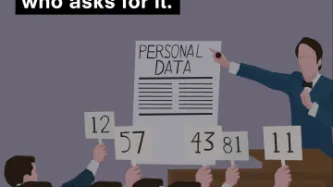Search
Content type: Video
<br />
Links
Read more about the ICO's provisional decision
Support our work
You can find out more about Clearview by listening to our podcast: The end of privacy? The spread of facial recognition
Content type: News & Analysis
What happened
On 22 July 2021, the Investigatory Powers Tribunal (IPT) issued a declaration on our challenge to the UK bulk communications regime finding that section 94 of the Telecommunications Act 1984 (since repealed by the Investigatory Powers Act 2016) was incompatible with EU law human rights standards. The result of the judgment is that a decade’s worth of secret data capture has been held to be unlawful. The unlawfulness would have remained a secret but for PI’s work.
You…
Content type: News & Analysis
Around the world, we see migration authorities use technology to analyse the devices of asylum seekers. The UK via the Policing Bill includes immigration officers amongst those who can exercise powers to extract information from electronic devices. There are two overarching reasons why this is problematic:
The sole provision in the Policing Bill to extract information rests on voluntary provision and agreement, which fails to account for the power imbalance between individual and state. This…
Content type: News & Analysis
It is difficult to imagine a more intrusive invasion of privacy than the search of a personal or home computer ... when connected to the internet, computers serve as portals to an almost infinite amount of information that is shared between different users and is stored almost anywhere in the world.
R v Vu 2013 SCC 60, [2013] 3 SCR 657 at [40] and [41].
The controversial Police Crime Sentencing and Courts Bill includes provision for extracting data from electronic devices.
The Bill…
Content type: Examples
UK police have used unmanned drones to monitor political protests for animal rights, by Extinction Rebellion, and against HS2, an extreme-right demonstration, and those held peacefully by Black Lives Matter, according to the campaign group Drone Watch. The Surrey, Cleveland, Staffordshire, Gloucestershire, and West Midlands forces all admitted to using drones at BLM events. Others admitting to using drones include Devon and Cornwall and Avon and Somerset.
https://www.theguardian.com/uk-news/…
Content type: Examples
A British freedom of information tribunal ruled that for national security reasons police in England and Wales may refuse to say whether they are using Stingrays, also known as IMSI-catchers, which are capable of tracking thousands of mobile phones and intercepting their calls, text messages, and other data. In 2016, the Bristol Cable found that police forces had bought hundreds of thousands of these devices disguised in public spending data by the acronym CCDC. Privacy International, which…
Content type: News & Analysis
The Aspen Card - the debit payment card given to asylum seekers that PI has previously exposed as a de facto surveillance tool - will be outsourced to a new company. The contract with Sodexo has come to an end and the company Prepaid Financial Services will be taking over.
Our campaign for transparency in relation to the Aspen Card and how it monitors asylum seekers continues. Not only do we demand clarity from the Home Office [read more here], we believe the new provider, Prepaid Financial…
Content type: News & Analysis
Back in 2019, UK Health Secretary Matt Hancock announced a partnership between the NHS and Amazon Alexa. The goal of the partnership was for Alexa to be able to use the content of the NHS website when people asked health-related questions.At the time, we expressed a number of concerns regarding this agreement: Amazon did not appear to be an actor that should be trusted with our health information, and seeing the Health Secretary publicly praising this new agreement appeared to give…
Content type: Long Read
The role of the Human Rights Act in shaping UK jurisprudence has been discussed at length since the European Convention on Human Rights was brought into UK law. This ongoing discussion was recently fueled by former UK Supreme Court judge Jonathan Sumption’s Reith Lectures, where he voiced concerns in relation to European Court of Human Rights (ECtHR) jurisprudence specifically in relation to Article 8 and the right to privacy.
We disagree with this view. The Human Rights Act has led…
Content type: Examples
Tom Hurd, a senior Home Office counter-terrorism official who was at Eton and Oxford with prime minister Boris Johnson, will lead the UK’s newly-established biosecurity centre; Hurd remains a candidate to take over as the next director general of MI6 later in 2020. Hurd, who has worked as a diplomat at the UN and in security, has no obvious scientific background. Independent experts believe the emphasis on security is misplaced, and that monitoring the status of coronavirus via local and…
Content type: Examples
The UK Ministry of Housing, Communities, and Local Government hired the AI firm Faculty, which had previously been contracted by prime ministerial special advisor Dominic Cummings to work for the Vote Leave campaign and which lists two current and former Conservative ministers among its shareholders, to monitor and analyse social media “to understand public perception and emerging issues of concern to HMG arising from the COVID-19 crisis”. Faculty was paid £400,000 for the work. The contract…
Content type: Examples
In May 2020, the UK’s Department of Health and Social Care hired McKinsey to help define the “vision, purpose, and narrative” of a permanent organisation to manage test and trace programmes. The new National Institute for Health Protection will be led by Baroness Dido Harding. McKinsey was paid £563,400 for several weeks of work. The contract did not give McKinsey access to users’ personal data; however, the consulting firm will own all concepts, tools, databases, and other outputs it has…
Content type: Examples
Cambridge Assessment, which operates one of the UK’s three big examination boards that administer most GCSE and A-level qualifications, says it approached ministers and the Department of Education two weeks before the publication of both sets of exam results to warn there were major problems in the way grades were being allocated. The exam regulator, Ofqual, responded that its enhanced appeal process would be sufficient to handle the few cases it expected would arise. In the event, serious…
Content type: Examples
The English regulator, the Care Quality Commission, and its Scottish equivalent, the Care Inspectorate, refused to disclose, in response to FOI requests, the COVID-19 death tolls in individual care homes in part to protect providers’ commercial interest and avoid undermining the UK’s care system, which relies on private operators. The regulators do share data on an individual home basis with their governments. Research has found that coronavirus outbreaks were up to 20 times more likely in…
Content type: News & Analysis
Earlier this week, the UK Government announced that no immigration status checks will be carried out for migrants trying to register with their GP and get vaccinated. But temporary offers of safety are not enough to undo the decades of harm caused by policies that have embedded immigration controls into public services.
Years of charging migrants for healthcare and sharing patient data with the Home Office has eroded trust between migrant communities and the NHS. As a result, they might not…
Content type: Examples
An immigration detention centre has been temporarily closed after several members of staff tested positive for coronavirus. The Home Office said Brook House, near Gatwick airport in West Sussex, has been shut for 10 days. It said a “very small number” of detainees had been moved to Colnbrook immigration removal centre near Heathrow.
Everyone being held at detention centres is being seen by a nurse and offered a Covid test, while face masks are provided; these are mandatory for all staff, it…
Content type: Press release
Today, the UK High Court has quashed a decision by the Investigatory Powers Tribunal (IPT), and ruled that section 5 of the Intelligence Services Act (ISA) 1994 does not permit the issuing of general warrants to authorise property interference and certain forms of computer hacking.
The Court referred to cases dating back to the 18th century, which demonstrate the common law’s insistence that the Government cannot search private premises without lawful authority even in the context of national…
Content type: Examples
A Sudanese man who had been seeking asylum in Ireland was deported to London just days before the UK capital went into the highest levels of COVID-related restrictions. The man, who is in his twenties, was deported last Thursday despite Irish government assurances to halt such removals during the pandemic. Due to travel restrictions currently in place, he is unable to return.
He is also now homeless and without support as London shuts down under Tier 4 lockdown restrictions, in the face of a…
Content type: Examples
The Home Office is pushing ahead with charter flights despite the UK’s new lockdown and soaring levels of coronavirus, in what campaigners say shows “contempt” for both deportees and the wider public.
Boris Johnson announced new, stricter coronavirus measures on Monday in an effort to slow the spread of the new, more transmissible variant of the virus, saying “everyone should now stay at home and only leave the house where absolutely necessary”.
Under the new rules, people are told that they…
Content type: Examples
In November 2018, the UK government announced it would pilot voter ID for in 11 local authorities during thte 2019 local elections in order to gain insight into ensuring voting security and lowering the risk of voter fraud. The Cabinet Office deemed the pilots conducted in five local authorities during the 2018 local elections to be a success. Four models of checking are under consideration: photo ID (Pendle, East Staffordshire, Woking); one photo or up to two non-photo IDs (Ribble Valley,…
Content type: Examples
A database compiled through investigations conducted in 2018 by the Guardian and the Undercover Research Group network of activists shows that undercover police officers spied on 124 left-wing activist groups between 1970 and 2007. The police infiltrated 24 officers over that time within the Socialist Workers Party, which, with a membership of a few thousand, advocates revolution to ablish capitalism. Four of these undercover officers began sexual relationships with deceived female members, and…
Content type: Examples
In 2018, after the UK Cabinet Office said a trial of compulsory voter ID was necessary because reports of voter fraud had more than doubled between the 2014 and 2016 elections - a claim immediately disputed by a voter and upheld by the UK Statistics Authority. While it was true that there were 21 reports in 2014 and 44 in 2016, the number fell to 28 in 2017, small numbers to begin with. Crucially, more than twice as many people voted in 2016, the year of the EU referendum. None of the five…
Content type: Examples
In 2018 a report from the Royal United Services Institute found that UK police were testing automated facial recognition, crime location prediction, and decision-making systems but offering little transparency in evaluating them. An automated facial recognition system trialled by the South Wales Police incorrectly identified 2,279 of 2,470 potential matches. In London, where the Metropolitan Police used facial recognition systems at the Notting Hill Carnival, in 2017 the system was wrong 98% of…
Content type: Examples
In October 2018, in the wake of the Cambridge Analytica scandal and questions over Facebook's influence on the UK's EU referendum, Facebook announced it would add Britain to the US and Brazil on the list of countries where the company will no longer allow political groups to publish "dark" ads on its network. Among the changes: all paid-for political content will be automatically published in a public library for up to seven years; individuals and organisations running ads with political…
Content type: Long Read
As our four year battle against the UK government’s extraordinarily broad and intrusive hacking powers goes to the Supreme Court, we are launching a new fundraising appeal in partnership with CrowdJustice.
We are seeking to raise £5k towards our costs and need your help. If we lose, the court may order us to pay for the government’s very expensive army of lawyers. Any donation you make, large or small, will help us both pursue this important case and protect the future ability of…
Content type: News & Analysis
Email addresses
Acxiom: [email protected]
Criteo: [email protected]
Equifax: [email protected]
Experian: [email protected]
Oracle: https://oracle.ethicspointvp.com/custom/oracle/dp/en/form_data.asp
Quantcast: [email protected] cc: [email protected]
Tapad: [email protected]
Letter for Acxiom and Oracle
subject line: Right to Erasure Request
I am concerned your company exploits my data.
In accordance with my right[s] under the General Data…
Content type: News & Analysis
Our team wanted to see how data companies that are not used to being in the public spotlight would respond to people exercising their data rights. You have the right under the EU General Data Protection Regulation ("GDPR") to demand that companies operating in the European Union (either because they are based here or target their products or services to individuals in the EU) delete your data within one month. We wrote to seven companies and requested that they delete our data, and we've made…
Content type: Press release
Today, Privacy International has filed complaints against seven data brokers (Acxiom, Oracle), ad-tech companies (Criteo, Quantcast, Tapad), and credit referencing agencies (Equifax, Experian) with data protection authorities in France, Ireland, and the UK. Privacy International urges the data protection authorities to investigate these companies and to protect individuals from the mass exploitation of their data.
Our complaints target companies that, despite exploiting the data of millions of…
Content type: Advocacy
Today, Privacy International has filed complaints against seven data brokers (Acxiom, Oracle), ad-tech companies (Criteo, Quantcast, Tapad), and credit referencing agencies (Equifax, Experian) with data protection authorities in France, Ireland, and the UK.
It’s been more than five months since the EU’s General Data Protection Regulation (GDPR) came into effect. Fundamentally, the GDPR strengthens rights of individuals with regard to the protection of their data, imposes more…
Content type: Long Read
Photo credit: Pixabay
This piece was originally published in iNews
It seems that you can’t go anywhere online at the moment without being reassured that ‘we respect your privacy’ and being directed to a 2,000-word privacy policy. You probably just click ‘got it, thanks’ because who has the luxury to stop and think about what their ‘privacy’ actually means?
But privacy is something that starts becoming far less abstract when you can see how it is being threatened and undermined, every day and…


















